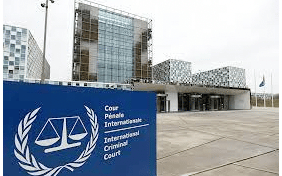The EU Observer
Both before and after Germany’s invasion of the Soviet Union during World War II, Soviet lawyer Aron Trainin proposed to criminalise the crime of aggression. The statute of the International Military Tribunal provided for criminal responsibility for waging an aggressive war, which became the main subject of the Nuremberg Trials.
The crime of aggression is often called the ‘mother of all crimes’ or ‘the supreme international crime’. Given the fact that other international crimes derive from the crime of aggression, it has absorbed all of them (accumulated evil of the whole).
-

Soviet lawyer Trainin addressing the London war crimes excutive committee meeting that set up the Nuremberg trials (Photo: Public Domain)
American international lawyer Beth Van Schaack emphasised that Trainin, the Soviet lawyer, had been inspired by the idea that international law is not the law of force but a force for peace. Also, he insisted that the victorious nations criminalise the crime of aggression and establish a permanent international court.
What a paradox — the Soviet Union and its progressive ideas on international law.
Due to the politics of his state, Trainin could not proclaim this clearly at meetings of the commission that prepared the London agreement on the International Military Tribunal (which we know as the Nuremberg Trials), and conveyed his ideas through the Czech envoy Bohuslav Echer, often without indicating the author.
But unlike in 1945, the Ukrainian idea of a Special Tribunal against the top leadership of Russia has its explicitly defined “creators”.
This idea has been in the works since the last days of February this year, when leading British international lawyer, professor Philip Sands QC, published an article in the Financial Times raising the question of why we should create a special tribunal that can try the leadership of the Russian Federation for the crime of aggression against Ukraine.
Ukrainian lawyers are working both with our colleagues and international lawyers on creating this special tribunal.. Among them are the British (in particular, Sands, Dapo Akande, Aarif Abraham), Americans (Alex Whiting), and Australians (Cary MacDougall). And among the Ukrainians, there is the minister of foreign affairs, Dmytro Kuleba, Mykola Hnatovskyi (currently a judge at the European Court of Human Rights) and Anton Korynevych — ambassador-at-large in the ministry of foreign affairs of Ukraine.
How will the tribunal work?
First of all, it has to be clarified that no permanent or existing international judicial institution is endowed with jurisdiction over Russian high-ranking officials.
The International Criminal Court in the Hague is investigating the situation in Ukraine. However, it exercises jurisdiction over three types of the most serious international crimes: the crime of genocide, crimes against humanity, and war crimes.
The crime of aggression against Ukraine cannot be considered by the court, since neither Ukraine nor Russia has ratified either the Rome Statute of the International Criminal Court or special amendments to it.
Similarly, because of its composition and the veto powers of its permanent members (ie Russia), we cannot expect the UN Security Council to determine that an act of aggression against Ukraine has occurred and refer the situation to the International Criminal Court itself.
Therefore, we need a special tribunal that will complement the ICC.
It will not create an alternative to the ICC but will complement the court in the context of jurisdiction over the crime of aggression against Ukraine.
The crime of Russia’s aggression against Ukraine has already been recognised by a resolution of the UN General Assembly. A special tribunal is, therefore, potentially the easiest way to prosecute Russian leaders.
At the same time, it is important that members of the international community are willing to breathe life into this proposed tribunal.
Who will be the defendants?
If we recall the Nuremberg Trials, it was supposed that high-ranking officials, military commanders and other individuals, including industrialists, who assisted Germany to rearm after World War I would be put on trial.
In the end, the only business figure indicted by Nuremberg prosecutors was Gustav Krupp, whose firm, the Krupp Group, produced important military equipment for the Third Reich using slave labour.
Today we do not know where our future tribunal will lead, but we do know that Putin is not the only one responsible for the terrible aggression against Ukraine.
It is not only about the apparatus of the state or militaries, we need to look much further: to propagandists, oligarchs, businessmen and diplomats (the latter, for example after tweets to execute soldiers of the Azov regiment).
But, of course, the key figures should be the representatives of the political and military leadership of the Russian Federation.
Read more at https://euobserver.com/opinion/156109




